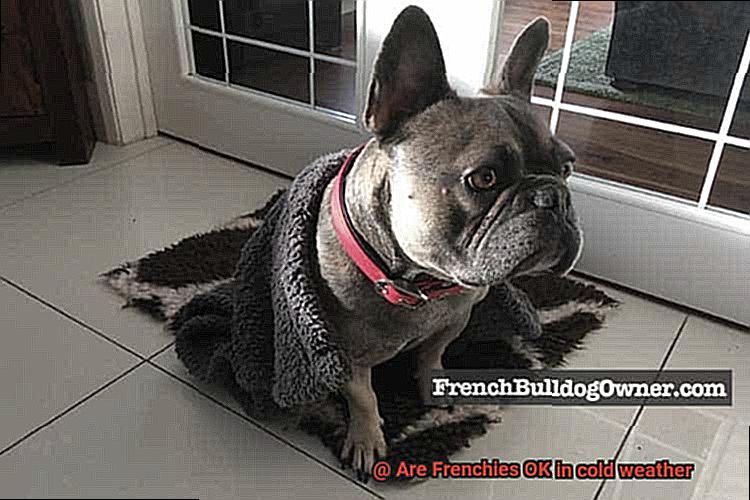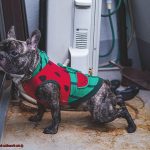Are Frenchies OK in cold weather?
Today, we’re tackling a question that has long puzzled our community: Can our beloved Frenchies handle the bone-chilling cold? As proud owners of these irresistible little bundles of joy, it’s only natural that we want to ensure their well-being, especially when Jack Frost comes knocking at our doors.
With their squishy faces and cuddly dispositions, French Bulldogs may not strike you as the most rugged breed when it comes to frosty temperatures. But hold your hot cocoa for a moment. Looks can be deceiving, my friends. In this blog post, we’ll embark on an adventurous journey into the world of French Bulldogs and uncover their hidden winter warrior spirit. So grab your favorite blanket, snuggle up with your furry companion, and let’s unravel the truth about whether these cuties can truly conquer the icy elements with style.
Are Frenchies OK in cold weather
Contents
- 1 Are Frenchies OK in cold weather
- 2 Understanding the Physiology of French Bulldogs in Cold Weather
- 3 Potential Health Risks of French Bulldogs in Cold Weather
- 4 Protecting Your Frenchie from the Cold
- 5 Keeping Your French Bulldog Warm in Winter
- 6 Tips for Taking Your Frenchie Outside During Cold Weather
- 7 Signs of Discomfort and Hypothermia in Frenchies
- 8 Using Booties to Protect Your Frenchie’s Paws from the Cold
- 9 Consulting a Vet for Advice on Keeping Your Frenchie Safe in Cold Weather
- 10 Conclusion
French Bulldogs, or Frenchies, are adorable and lovable companions known for their affectionate nature. However, their short, thin coats raise concerns about their ability to handle cold weather. In this article, we’ll explore whether Frenchies are suited for chilly temperatures and provide tips to keep them safe and comfortable during colder months.
Understanding the Challenges:
French Bulldogs have a low tolerance for cold due to their short coat and lack of a thick undercoat. Here are some challenges they may face in cold weather:
- Hypothermia and Frostbite: Frenchies are more susceptible to these conditions compared to breeds with thicker fur. It’s important to limit their time outdoors in freezing temperatures and provide appropriate protection.
- Respiratory Issues: French Bulldogs’ brachycephalic (flat-faced) structure makes it harder for them to breathe in colder air. This can lead to breathing difficulties, especially if they have pre-existing respiratory problems.

Tips to Keep Your Frenchie Warm and Cozy:
While French Bulldogs may not be naturally adapted to cold weather, with proper care, they can handle moderately cold temperatures. Here’s what you can do:
- Dress Your Frenchie Appropriately: Use dog sweaters or coats to provide extra insulation and protect them from the cold. Ensure the clothing is comfortable and doesn’t restrict their movement or breathing.
- Monitor Their Behavior: Watch for signs of discomfort such as shivering, seeking warmth, or lifting paws off the ground. If you notice any of these signs, bring your Frenchie indoors or provide additional warmth.
- Limit Outdoor Time: Short walks or bathroom breaks are generally sufficient, while extended periods in freezing temperatures should be avoided. Consider using booties to protect their paws from freezing temperatures and harsh elements.
- Create a Warm Indoor Environment: Provide a cozy bed or blanket for your Frenchie, away from drafts or cold surfaces. You can also use space heaters or heated blankets in designated areas where they spend most of their time.
- Maintain Hydration: Even in cold weather, it’s important to keep your Frenchie hydrated. Proper hydration helps regulate their body temperature and overall well-being.
- Regular Grooming: Keep your Frenchie’s coat clean and free from mats to provide better insulation and prevent moisture buildup, which can lead to discomfort and potential health issues.
Consult with a Veterinarian:
Remember, every Frenchie is unique, and factors such as age, health, and overall condition can influence their ability to withstand cold weather. It’s essential to consult with a veterinarian who is familiar with French Bulldogs for personalized advice based on your dog’s individual needs.
Understanding the Physiology of French Bulldogs in Cold Weather
French Bulldogs, with their adorable appearance and lovable personalities, are a popular breed among dog owners. However, their unique physiology can make them more susceptible to the challenges posed by cold weather. In this article, we will explore the various aspects of their physiology that affect their ability to tolerate colder temperatures.
- Short and Thin Coat: French Bulldogs have a short and thin coat, which means they have limited insulation against the cold. Unlike breeds with thick double coats, such as Huskies or Malamutes, Frenchies are more likely to feel the chill and struggle to maintain their body temperature in colder environments. To combat this, it is important for owners to provide them with extra layers of warmth, such as cozy sweaters or jackets.
- Brachycephalic Facial Structure: The unique short-nosed facial structure of French Bulldogs, while adorable, can pose challenges in cold weather. Brachycephalic breeds often have difficulty regulating their body temperature due to their shortened airways. In cold weather, this can be further exacerbated by the fact that the air they breathe in may be colder and drier, potentially causing respiratory distress. It is crucial for owners to limit outdoor time in extreme cold and ensure their Frenchies have access to warm and humidified indoor environments.
- Low Body Fat Percentage: French Bulldogs have a relatively low body fat percentage compared to some other breeds. Fat acts as an insulator and helps keep the body warm in cold temperatures. With less fat to provide insulation, Frenchies may struggle to retain heat and may be more susceptible to hypothermia or frostbite when exposed to extreme cold for prolonged periods. Owners should be mindful of their Frenchie’s exposure to cold temperatures and take appropriate measures to provide warmth when needed.
- Susceptibility to Health Conditions: French Bulldogs are known to have a higher risk of respiratory issues and allergies compared to other breeds. Cold weather can potentially exacerbate these conditions, making it even more challenging for Frenchies to cope with colder temperatures. It is crucial for owners to monitor their Frenchie’s health closely during cold weather and seek veterinary attention if any concerning symptoms arise.
While French Bulldogs may face challenges in cold weather due to their physiology, it is important to remember that each individual dog is unique. Factors such as age, overall health, and acclimatization play a significant role in how well a French Bulldog can tolerate cold weather. Some Frenchies may handle cold temperatures better than others, while some may struggle even in milder cold conditions. As responsible owners, it is our duty to understand our Frenchie’s needs and provide them with the necessary care and protection during colder months.
Potential Health Risks of French Bulldogs in Cold Weather
When the temperatures drop, it’s important to be aware of the potential health risks that French Bulldogs may face. These adorable pups may be more susceptible to certain issues due to their unique physiology. Let’s explore these potential health risks and learn how to keep our furry friends safe and comfortable in the cold weather.
Hypothermia: A Chilling Concern
French Bulldogs have a short coat and lack body fat, which means they have less insulation against the cold. This makes them more prone to hypothermia, a condition where the body loses heat faster than it can produce it. Keep an eye out for signs of hypothermia, such as shivering, lethargy, pale gums, and difficulty breathing. If you suspect your Frenchie is suffering from hypothermia, immediately move them to a warm area, wrap them in a blanket, and contact your veterinarian.
Frostbite: Protect Those Sensitive Extremities
The sensitive extremities of French Bulldogs, such as their ears, paws, and tail, are at risk of frostbite when exposed to freezing temperatures. Frostbite can cause tissue damage, pain, and even infection if left untreated. To prevent frostbite, consider using protective clothing like sweaters or coats for your Frenchie and limit their exposure to extreme cold. If you notice any signs of frostbite, such as redness or swelling on their extremities, seek veterinary help promptly.
Respiratory Issues: Take a Breath with Caution
French Bulldogs already have compromised respiratory systems due to their brachycephalic facial structure. In cold weather, the cold air can exacerbate their respiratory issues, leading to coughing, wheezing, and breathing difficulties. This can be especially problematic for French Bulldogs with brachycephalic airway syndrome or other respiratory conditions. Keep an eye on your Frenchie’s breathing and consult with your veterinarian for guidance on managing their respiratory health during the winter months.
Joint and Muscle Stiffness: Take It Easy, Buddy
Cold weather can cause joint and muscle stiffness in French Bulldogs. The cold temperature can make their muscles tighten and their joints become stiff, making movement challenging and painful for them. Help alleviate their discomfort by providing warm and cozy bedding, using heating pads or blankets, and considering joint supplements recommended by your veterinarian.
Protecting Your Frenchie: Winter Safety Tips
To keep your French Bulldog safe and comfortable in cold weather, consider the following tips:
- Provide adequate shelter: Ensure your Frenchie has a warm and insulated shelter to retreat to when the temperatures drop. Consider using heating options, such as heat lamps or heated beds, to provide extra warmth.
- Dress them up: Invest in sweaters or coats specifically designed for French Bulldogs to help keep them warm during walks or outdoor playtime.
Protecting Your Frenchie from the Cold
Winter is here, and that means it’s time to bundle up and stay warm. But what about our furry friends, like French Bulldogs, who aren’t built for cold weather? Don’t worry, I’ve got you covered with some tips and tricks to keep your Frenchie cozy all winter long.
- Dress to Impress: Just like we layer up in sweaters and jackets, your Frenchie can benefit from some fashionable outerwear too. Look for doggy sweaters or coats that are designed for small breeds like French Bulldogs. Make sure they fit snugly and cover their entire body, from their neck to their belly. Who says fashion and function can’t go paw in paw?
- Boot Up: Imagine walking barefoot on icy cold ground – not a pleasant thought, right? Well, the same goes for your Frenchie’s paws. Protect them from frostbite by investing in some doggy boots. These boots will not only keep their paws warm but also provide traction on slippery surfaces.
- Short and Sweet: When it’s freezing outside, it’s best to limit your Frenchie’s outdoor activities. Quick bathroom breaks and short walks should do the trick. Look for a sheltered area where they can do their business without being exposed to harsh winds or freezing temperatures. No one likes a cold booty.
- Harness the Warmth: Collars may be stylish, but they can cause discomfort in chilly weather. Opt for a harness instead. It distributes pressure evenly and keeps your Frenchie’s neck protected from the elements. Safety and style in one package – what more could you ask for?
- Home Sweet Home: Keep your home warm and cozy for your Frenchie. Make sure your heating system is working properly and providing enough warmth. If you want to go the extra mile, add some blankets or heated pads to their bed area for a toasty snooze fest. They’ll love you even more for it.
- Watch for Warning Signs: Keep an eye out for signs that your Frenchie may be too cold. Shivering, lethargy, pale gums, or difficulty walking could be indications that they need to warm up ASAP. If you notice any of these symptoms, bring them inside immediately and consult with a veterinarian if necessary. Better safe than sorry.
Keeping Your French Bulldog Warm in Winter
With their short coats and lack of insulation, Frenchies are more susceptible to the cold than some other breeds. But fear not. I’m here to share my expert tips on how to keep your French Bulldog warm and snug all winter long.
Fashionable Winter Wear:
Invest in high-quality dog sweaters or jackets designed specifically for smaller breeds like French Bulldogs. These stylish garments should cover their entire body, from neck to tail, providing both warmth and freedom of movement. Not only will your Frenchie look fabulous, but they’ll also stay cozy in even the coldest weather.
The Perfect Doggy Bed:
Choose a dog bed that is raised off the ground and offers extra padding or insulation. This will prevent your pup from coming into contact with cold surfaces and help retain their body heat. Pro tip: Look for beds with removable covers for easy cleaning, as French Bulldogs are notorious for shedding.
Paw Protection:
Protect your Frenchie’s precious paws from ice and salt on the ground by investing in dog booties. These little shoes not only keep their feet warm but also prevent irritation and injury. Plus, they can add a touch of flair to your pup’s winter ensemble.
Bundle Up for Shorter Walks:
While exercise is still important during winter, it’s crucial to limit your Frenchie’s exposure to low temperatures. Keep walks shorter and avoid areas with strong winds or extreme cold. Remember, French Bulldogs are prone to respiratory issues, so it’s better to be safe than sorry.
Hydration Matters:
Don’t forget that dehydration can occur even in cold weather. Ensure your Frenchie has access to fresh water at all times, and consider adding a little warm water or broth to their meals to entice them to drink more. Staying hydrated helps regulate body temperature and keeps your pup healthy during winter.
Comfortable Indoors:
Maintain a comfortable and consistent indoor temperature for your Frenchie. While it’s tempting to crank up the heat, be mindful that French Bulldogs are sensitive to high temperatures too. Ensure your home is warm but not too hot, as this can lead to discomfort or even heatstroke.
Tips for Taking Your Frenchie Outside During Cold Weather
French Bulldogs are adorable and lovable companions, but they are also sensitive to extreme temperatures, including cold weather. While they may handle the cold better than hot weather, it is crucial to take precautions to ensure their safety and comfort when taking them outside during colder months. In this article, we will explore some essential tips to help you navigate outdoor adventures with your Frenchie in chilly weather.
Bundle Up Your Frenchie:
Frenchies have short coats and minimal body fat, making them more susceptible to getting cold. Dressing them appropriately for the weather is essential. Invest in a high-quality dog coat or sweater that covers their entire body, including their chest and belly. This will provide an extra layer of insulation and protect them from the cold.
Limit Outdoor Time:
While Frenchies may enjoy frolicking in the snow, prolonged exposure to cold weather can be dangerous. Keep outdoor activities short and monitor your Frenchie closely for any signs of discomfort or distress. If they start shivering or lifting their paws off the ground, it’s time to bring them back indoors.
Choose the Right Time:
Timing is everything when it comes to taking your Frenchie outside during cold weather. Avoid the coldest parts of the day, such as early morning or late evening. Opt for midday when temperatures are slightly warmer, but still be mindful of wind chill factors.
Protect Their Paws:
Snow, ice, and salt on sidewalks can be harsh on your Frenchie’s sensitive paws. Consider using booties with good traction to provide stability and protect their paws from freezing temperatures and harmful substances. Remember to wipe their paws after walks to remove any potential irritants.
Create a Cozy Retreat:
After being outside in the cold, your Frenchie needs a warm and comfortable place to retreat to indoors. Provide them with a cozy bed or blanket in a draft-free area. You can also consider using a heated dog bed or placing a heating pad under their bedding for added warmth.
Watch for Warning Signs:
Pay close attention to your Frenchie’s behavior and look out for signs of cold-related health issues. If they start shivering uncontrollably, appear lethargic, have pale gums, or experience difficulty breathing, bring them indoors immediately and consult with a veterinarian.
Signs of Discomfort and Hypothermia in Frenchies
However, it’s essential to be aware of how cold weather can affect them. Frenchies may not be the best at handling chilly temperatures due to their short coats and small size. In this blog post, we’ll discuss the signs of discomfort and hypothermia in Frenchies during cold weather and provide tips on how to keep them warm and safe.
Signs of Discomfort:
- Shivering: Just like us, Frenchies shiver to generate heat when they feel cold. If you notice your Frenchie shaking or trembling, it’s a clear indication that they need some extra warmth.
- Seeking Warmth: Frenchies are notorious cuddlers, but if you find your Frenchie constantly snuggling up to you or other pets, it’s a sign that they’re trying to stay warm. They may also seek out warm spots in your home or huddle near radiators.
- Slowed Movement or Lethargy: When feeling uncomfortable in colder temperatures, Frenchies may become less active and seem more sluggish than usual. Keep an eye out for any changes in their energy levels.
Signs of Hypothermia:
Hypothermia is a serious condition that occurs when a Frenchie’s body temperature drops dangerously low. Recognizing the signs early on is crucial for their well-being.
- Uncontrollable Shivering: Severe shivering that doesn’t subside even after being brought indoors is a sign of hypothermia.
- Pale or Blue Gums: Check your Frenchie’s gums regularly. If they appear pale or bluish instead of their usual pink color, it could indicate hypothermia.
- Weak Pulse and Shallow Breathing: Hypothermia affects the body’s vital functions. If you notice your Frenchie’s pulse weakening or their breathing becoming shallow, seek immediate veterinary attention.
- Confusion: A confused or disoriented Frenchie may be experiencing hypothermia. They may appear dazed or have difficulty responding to their surroundings.
Taking Action:
If you notice any signs of discomfort or hypothermia in your Frenchie, it’s important to act quickly to ensure their safety and well-being.
- Bring them indoors immediately and provide a warm environment.
- Wrap them in blankets or towels to help raise their body temperature.
- In severe cases of hypothermia, seek veterinary attention promptly.
Prevention is Key:
To prevent discomfort and hypothermia in Frenchies during cold weather, follow these helpful tips:
- Limit outdoor exposure: Keep your Frenchie indoors as much as possible during chilly weather.
Using Booties to Protect Your Frenchie’s Paws from the Cold
We all know that French Bulldogs are adorable little goofballs, but did you know that they can be extra sensitive to cold weather? With their short coats and low body fat, those chilly temperatures can really take a toll on their paws.
That’s why it’s important to protect their little tootsies with booties. In this section, we’ll dive into all the nitty-gritty details of using booties to keep your Frenchie’s paws nice and cozy.
Choosing the Right Booties
When it comes to selecting booties for your Frenchie, there are a few key factors to consider. First and foremost, make sure you choose booties that are specifically designed for dogs.
Human shoes just won’t cut it for these little guys. Look for booties made from waterproof and insulated materials to keep their paws dry and warm.
Size Matters
Just like picking out a new pair of shoes for yourself, you’ll want to make sure you get the right fit for your Frenchie’s paws. Measure their paws accurately before making a purchase. Ill-fitting booties can cause discomfort or even fall off during walks – not exactly what we’re going for here.
Introduce Booties Gradually
Now that you’ve got the perfect pair of booties, it’s time to introduce them to your Frenchie. Start by letting them sniff and inspect the booties. Trust me, they’ll be curious. Then, reward them with treats and positive reinforcement as they become more comfortable with the idea of wearing booties. Positive association is key here.
Putting on the Booties
Alright, it’s showtime. Gently slide each paw into the appropriate bootie, making sure they fit snugly but not too tight. We don’t want to restrict blood flow or make your Frenchie uncomfortable. Once they’re all geared up, secure the booties firmly and get ready for the cutest winter walk ever.
Take It Slow
Remember, your Frenchie may need some time to adjust to wearing booties. Start with short walks to allow them to get used to the feeling. Observe their behavior and comfort level during these walks. As they become more accustomed to the booties, gradually increase the duration of your outings.
After-Walk Care
After each winter adventure, remove the booties and give your Frenchie’s paws a good inspection. Look out for any signs of irritation or injury. Clean their paws thoroughly and make sure they’re nice and dry before putting the booties back on.
Remember, Booties Aren’t Everything
While booties are a great tool for protecting your Frenchie’s paws from the cold, they shouldn’t be the only line of defense. Layering their clothing with a cozy sweater or jacket can provide extra insulation and keep them even warmer.
Consulting a Vet for Advice on Keeping Your Frenchie Safe in Cold Weather
When it comes to keeping your French Bulldog safe in cold weather, consulting a veterinarian is crucial. Vets are trained professionals who can provide expert advice tailored to your Frenchie’s specific needs and health condition. In this article, we will explore the importance of veterinary consultation and discuss key tips for keeping your Frenchie safe in colder months.
The Importance of Veterinary Consultation:
Consulting a vet ensures that you receive accurate and reliable information about your Frenchie’s well-being in cold weather. Vets have extensive knowledge and experience in caring for dogs, including breed-specific considerations. They can assess your Frenchie’s overall health and provide personalized recommendations to keep them safe and comfortable during colder months.
Regular Check-ups:
Scheduling regular check-ups with your vet is essential, especially before winter arrives. These check-ups allow the vet to evaluate your Frenchie’s health, identify any underlying conditions, and provide appropriate guidance for cold weather care.
Understanding Temperature Tolerance:
French Bulldogs have unique characteristics that make them more susceptible to cold-related issues. Their short muzzles and compromised respiratory systems can make it difficult for them to regulate body temperature. Even though they have a thick coat, Frenchies may struggle in extremely cold temperatures. Consulting a vet will help you understand your Frenchie’s temperature tolerance and take necessary precautions.
Recognizing Signs of Cold-Related Problems:
It’s important to be aware of the signs of cold-related problems in your Frenchie. Shivering, lethargy, difficulty breathing, pale gums, and frostbite are all signs that your dog may be experiencing discomfort or health issues due to the cold. If you notice any of these symptoms, seeking immediate veterinary attention is crucial.
Clothing and Protective Gear:
Appropriate clothing can provide insulation and protect your Frenchie from hypothermia. Consult with your vet about the use of clothing and protective gear for your Frenchie in cold weather. However, not all dogs tolerate wearing clothes, so it’s essential to get professional advice before introducing any garments.
Dietary Adjustments:
Discuss dietary adjustments with your vet during colder months. Some Frenchies may require additional calories to maintain body temperature, while others may benefit from a more warming diet. Your vet can provide personalized guidance based on your Frenchie’s age, weight, and health status.
Indoor Safety:
Creating a warm and safe indoor environment is crucial for your Frenchie’s well-being. Provide a cozy bed away from drafts, use space heaters with caution, and ensure proper ventilation to prevent carbon monoxide poisoning. Regularly check heating devices and electrical cords to prevent accidents.
Em5WE9QFfa0″ >
Conclusion
French Bulldogs may not be ideal for cold weather conditions.
Due to their short coats and small size, they are more susceptible to the cold than other breeds. It is important to take extra precautions to keep them warm and protected during chilly temperatures.
Additionally, it’s crucial to monitor their behavior for signs of discomfort or distress, such as shivering or seeking warmth.




